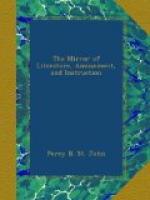cause, and nothing less, could effect the cordial
union of the parties. Neither does he suppress
any instance of kindness by which the sufferings of
the martyrs were mitigated; and as St. Luke tells
us of the centurion entreating Paul courteously, so
does Fox relate of Saunders, that when his wife came
to the prison gate, with her young child in her arms,
to visit her husband, the keeper, though he durst
not suffer her to enter the prison, yet took the little
babe out of her arms and brought him to his father,
to his exceeding great joy: and of Hooper’s
guard, that they interceded with the sheriffs of Gloucester
on behalf of their charge, that he might not be sent
to the common gaol, they declaring at large how quietly,
mildly, and patiently he had behaved himself in the
way, and adding, that they would rather themselves
be at the pains to watch with him than that he should
be so handled: and of Rowland Taylor, that his
wife and son Thomas were permitted to sup with him
in the Counter, “by the gentleness of his keepers;”
and afterwards, that of his guard three out of the
four used him friendly. It was to be expected
that a work which, had it been published a few years
sooner (supposing this possible), would probably have
added its author to the catalogue of his own martyrs,
should excite no small stir amongst the Catholics,
and so it came to pass. But they weakened the
force of their attack by betraying prematurely the
spirit which animated them, sarcastically inquiring,
even before its publication, when the “Golden
Legend” was to appear, and denouncing the “Calendar
of Saints,” which they had heard was to be prefixed
to it, as blasphemy against their own. But Fox
went on, as he says, without fear and without favour;
and no sooner was Elizabeth, to whom he dedicated,
out of the way, than an examination of the book appeared,
by Parsons the Jesuit, in his “Three Conversions
of England,” which has furnished more modern
objectors with most of the weapons of their warfare.
But Parsons writes in a temper which defeats itself.
He deals in vague vituperation, rather than in specific
accusations of error; or where he ventures upon the
latter, he often either wilfully or ignorantly misreads
Fox, as in the vapid pleasantry wasted upon Joan Lashford,
a married maid, as he is pleased to call her;[20]
or he triumphs over him by exposing some flaw in the
character of a martyr with an eureka, which
the honest martyrologist himself did not affect to
conceal, and for the knowledge indeed of which Parsons
is altogether indebted to him, as where he makes himself
merry with the discordant sentiments of nine martyrs
executed together, though their want of uniformity
is a fact which he learns from Fox himself, who at
the same time asserts that their disagreement was in
smaller things only;[21] or he prefers charges against
him at random without troubling himself to ascertain
whether there is foundation for them or not, as where
he accuses him of defacing or destroying the records




